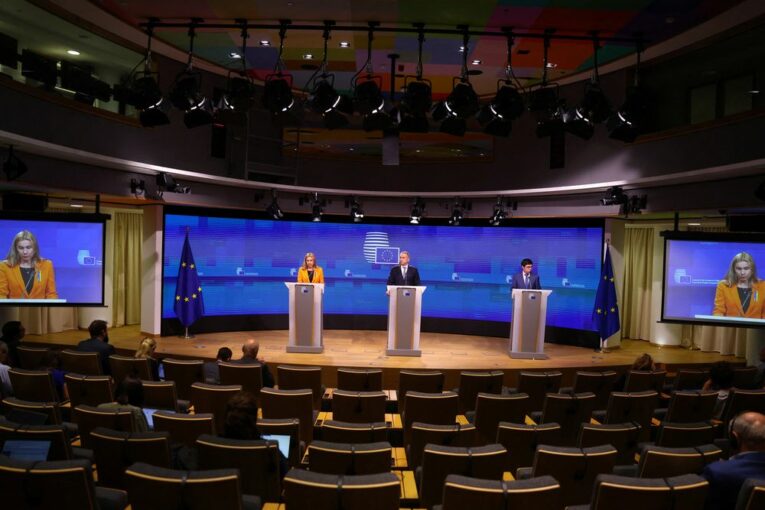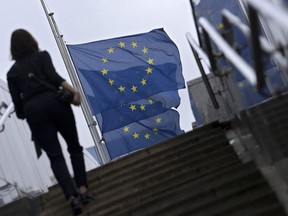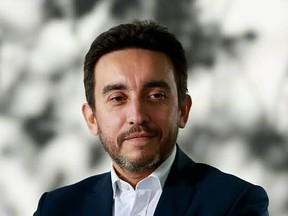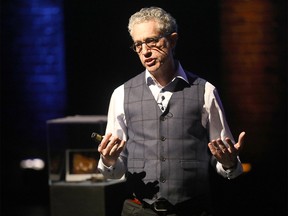
Europe’s energy crisis deepened this week as Russian President Vladimir Putin threatened to turn off the oil and gas taps to countries that adopt price caps on its resources.
On Friday, European Union energy ministers gathered to develop a plan and ensure adequate supplies this winter and buffer consumers from spiralling bills.
The situation serves as a painful reminder that energy security — including access to affordable supplies — is essential and today’s chaos will have ramifications for the necessary transition ahead.
This is a “moment of awakening,” said author Bruno Maçães, who previously served as Portugal’s secretary of state for European affairs and will speak at this month’s Energy Disruptors summit in Calgary.
“Practically, it is a moment when every geopolitical actor is striving to control access to energy flows,” Maçães said in an interview this week.
“There is a lot to think about in terms of the energy transition, a moment of awakening as well, that the energy transition is not what we thought it would be.”
A senior adviser at consultancy Flint Global and author of the book Geopolitics for the End Time, Maçães will address the three-day conference on Sept. 20 — opening day — to discuss energy security and the new world order.
There are no shortages of issues to tackle.
Natural gas and power prices are soaring in Europe this year. EU energy ministers met Friday in Brussels, scrambling to build a plan for the coming months, with some musing about placing price caps on imported gas. Formal plans are expected next week.
They need to come quickly.

Consultancy Rystad Energy noted August power prices were at all-time highs in Europe and “are not expected to ease without government intervention.”
In recent months, countries from France to Poland have rolled out aid packages to help consumers and businesses hammered by rising energy bills.
On Thursday, the United Kingdom released its plan to cap energy prices for consumers. It’s estimated to cost up to US$172 billion, while the growing price tag for the region to subsidize bills is more than $500 billion, according to CNN.
On Wednesday, Putin said Russia would halt energy exports to the West if price caps are placed on its natural gas and oil.
As some countries seek to secure LNG supplies for the upcoming winter months, they’re also emphasizing investments in clean energy and the transition away from fossil fuels.
“We are in a lot of trouble because the energy transition is in many respects almost an impossible mission. It involves jumping from one vessel to another vessel while the two are moving at a very fast speed,” Maçães said.
“It’s an extremely delicate operation where lots of things could go wrong.”

The last time the Energy Disruptors conference was held in person, in 2019, oil markets were grappling with a drone attack on Saudi Arabia’s massive oil processing centre, with crude prices hovering around US$59 a barrel.
That seems like a lifetime ago, before the pandemic, the 2020 collapse in oil prices, and Russia’s attack on Ukraine this year that sent crude prices spiralling.
Security of supply is now front and centre — along with the need for decarbonization — in a sweeping debate about energy.
Higher prices are battering consumers, although Maçães believes European countries have the budget capacity and willingness to help families and households.
However, he is concerned about the long-term effect on heavy industry in Europe, potentially threatening viable and strategically important businesses, such as those in the steel and aluminum sectors.
“The lesson we have to draw is that geopolitics matters … there has to be an emphasis on energy security together with energy transition, on some viable grounds,” he said.
“There’s going to be, at least for the next five years, exclusive focus on securing supply and that’s going to take precedence over everything.”

Energy economist and author Peter Tertzakian, who will also be speaking on the first day of the conference about the journey to net-zero emissions by 2050, said countries and consumers have taken energy security for granted in recent decades.
It was only 15 years ago people talked about peak oil, but the shale revolution ushered in an “era of abundance” with relatively cheap prices, he said.
Now, European electricity prices are at all-time highs with little signs of abating; prices in North America are climbing, albeit at a much slower pace.
“Energy security and affordability are going to be a theme here, too. It just hasn’t completely manifested itself in the economy,” he said in an interview.
Tertzakian, deputy director of the ARC Energy Research Institute, worries about a “regressive transition” coming out of the energy crisis that could put the world behind on reaching net-zero by 2050.
Recommended from Editorial
-

EU to claw back energy firms’ profits rather than cap Russian gas price
-

Varcoe: Canada ‘falling behind’ in race to attract carbon capture investments
-

Varcoe: It’s time for Ottawa to stop dithering about backing a bigger Canadian LNG industry
-

Varcoe: New CAPP president takes over helm during a complicated energy conversation
Some countries are moving back to burning coal. Others, like the U.K., are looking to bolster domestic output, with the country lifting a fracking moratorium.
“We’ve lost five years if we’re not careful. But after that, maybe there will be an acceleration,” Tertzakian added.
The conference is expected to attract more than 2,000 attendees. It also includes sessions on investment trends in clean energy, battery storage, decarbonizing the global coal fleet and future fuels.
Conference co-founder Graeme Edge said energy security has returned to centre stage in a broader discussion, not only surrounding oil and gas but also for access to critical minerals needed for batteries in the transition.
“We are going to need multiple solutions from multiple different energy sources,” he said.
“In many ways, we all take for granted reliable, affordable electricity and energy. And what we’re seeing in Europe is when that doesn’t happen, suddenly you have massive consequences.”
Chris Varcoe is a Calgary Herald columnist.
You can read more of the news on source
